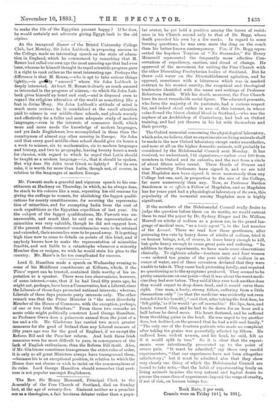At the inaugural dinner of the Bristol University College Club,
last Monday, Sir John Lubbock, in proposing success to the College, made an interesting speech on the state of educa- tion in England, which be commenced by remarking that M. Renan had called our own age the most amusing age that had ever been, whereas he himself thought its rapid scientific progress gave it a right to rank rather as the most interesting age. Perhaps the difference is that M. Renan,—who is apt to take serious things lightly,—is grdlitly " amused " where Sir John Lubbock is deeply interested. At least M. Renan is clearly as much amused as interested in the progress of science,--to which Sir John Lub- bock gives himself up heart and soul,—and is disposed even to regard the religions education of the world as something like a feat in divine illbny. Sir John Lubbock's attitude of mind is much more serious ; he is scandalised at the small attention paid to science in our middle-class schools, and pleads warmly and effectively for a fuller and more adequate study of modern languages,—even in the interests of commerce itself, which more and more needs the knowledge of modern languages, and yet finds Englishmen less accomplished in them than the countrymen of almost any other country in Europe. Sir John said that every good middle-class school should give six hours a a week to science, six to mathematics, six to modern languages and history, and two to geography, leaving twenty hours a week for classics, with regard to which he urged that Latin should be taught as a modern language—i.e., that it should be spoken. But why does Sir John treat Greek so lightly ? For its own sake, it is worth far more than Latin, though not, of course, in relation to the languages of modern Europe.


































 Previous page
Previous page